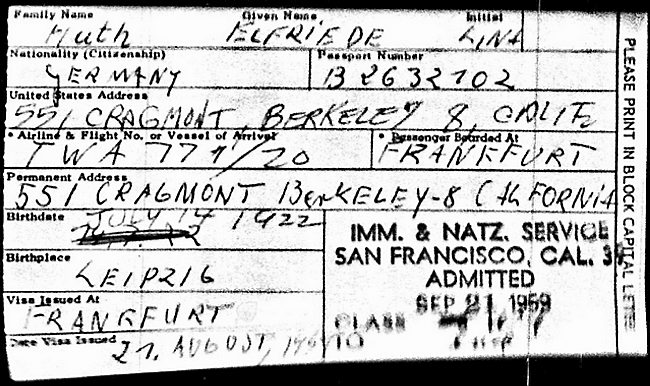Nazi war criminals got $20.2 million in Social Security
Elfriede Rinkel’s past as a Nazi concentration camp guard didn’t keep her from collecting nearly $120,000 in U.S. Social Security benefits.

This digital image from the Immigration and Naturalization Service and the National Archives shows an immigration document for Elfriede Huth, later Elfriede Rinkel, when she was admitted to the U.S. in 1959. Rinkel admitted to being a Nazi concentration camp guard during World War II, but her past didnâ t keep her from collecting nearly $120,000 in American Social Security benefits after she had been deported in 2006.
Rinkel admitted to being stationed at the Ravensbrueck camp during World War II, where she worked with an attack dog trained by the SS, according to U.S. Justice Department records. She immigrated to California and married a German-born Jew whose parents had been killed in the Holocaust.
She agreed to leave the U.S. in 2006 and remains the only woman the Justice Department’s Nazi-hunting unit ever initiated deportation proceedings against. Yet after Rinkel departed, the Social Security Administration kept paying her widow benefits, which began after her husband died, because there was no legal basis for stopping them until late last year.
Rinkel is among 133 suspected Nazi war criminals, SS guards and others that may have participated in the Third Reich’s atrocities who received $20.2 million in Social Security benefits, according to a report to be released later this week by the inspector general of the Social Security Administration. The Associated Press obtained a copy of the report.
The payments are far greater than previously estimated and occurred between February 1962 and January 2015, when a new law called the No Social Security for Nazis Act kicked in and ended retirement payments for four beneficiaries. The report does not include the names of any Nazi suspects who received benefits. But the descriptions of several of the beneficiaries match legal records detailing Rinkel’s case and others.
The large amount of the benefits and their duration illustrate how unaware the American public was of the influx of Nazi persecutors into the U.S., with estimates ranging as high as 10,000. Many lied about their Nazi pasts to get into the U.S. and even became American citizens. They got jobs and said little about what they did during the war.
Rep. Carolyn Maloney, D-N.Y., requested that the Social Security Administration’s inspector general look into the scope of the payments following an AP investigation, which was published in October 2014.
AP found that the Justice Department used a legal loophole to persuade Nazi suspects to leave the U.S. in exchange for Social Security benefits. If they agreed to go voluntarily, or simply fled the country before being deported, they could keep their benefits. The Justice Department denied using Social Security payments as a way to expel former Nazis.
By March 1999, 28 suspected Nazi criminals had collected $1.5 million in Social Security payments after their removal from the U.S., Social Security Administration records uncovered by AP showed. Since then, AP estimated the amount paid out had grown substantially. That estimate was based on the number of suspects who qualified and the three decades that have passed since the first former Nazis, Arthur Rudolph and John Avdzej, signed agreements that required them to leave the country but ensured their benefits would continue.
The inspector general’s report used computer-processed data and other internal agency records to develop a comprehensive picture of the total number of Nazi suspects who received benefits and the dollar amounts paid out. The Social Security Administration last year refused AP’s request for those figures.
The report said $5.6 million was paid to 38 former Nazis before they were deported. Ninety-five Nazi suspects who were not deported but were alleged or found to have participated in the Nazi persecution received $14.5 million in benefits, according to the report.
The Social Security Administration did not respond to a request for comment.
But in informal comments to the IG, the agency and the Justice Department said the pool of 133 suspects included individuals who were not deported and may not have had any role with the Nazis. The Justice Department requested the report include only the names of 81 people it had provided to the IG. The department said those individuals had conclusively been determined to be involved in the Nazi persecution.
http://www.twincities.com/nation/ci_28227548/ex-nazis-got-20-2-million-social-security
